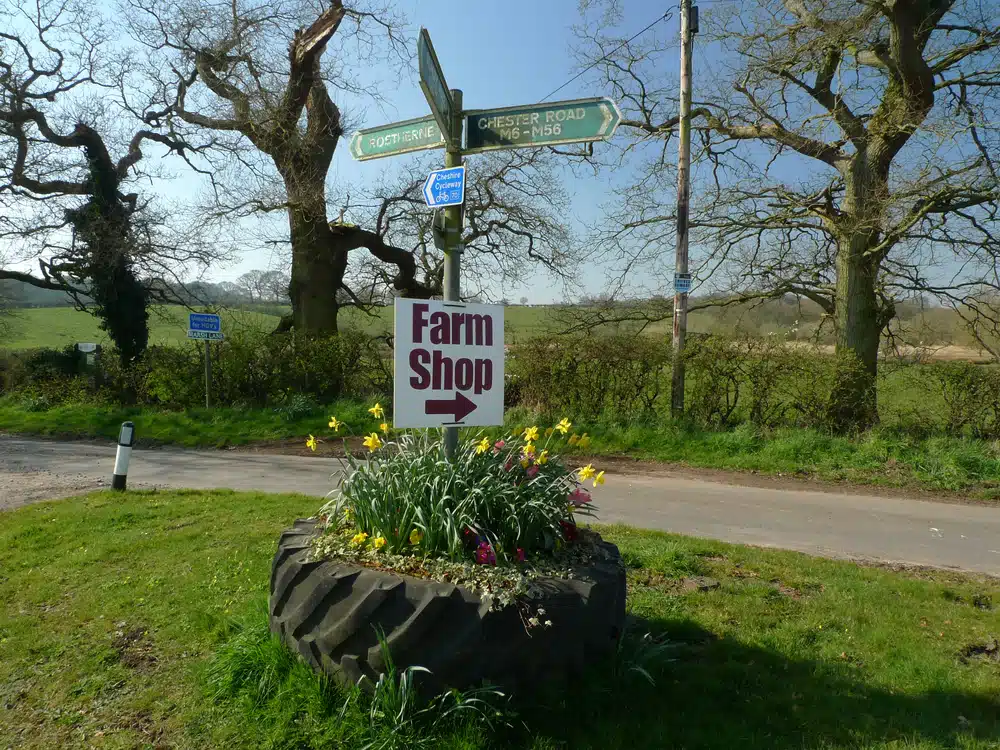
Furthermore, if you intend to also sell alcohol at your farm shop, be aware that it is illegal for shops to remain open on Sundays or bank holidays in certain parts of the UK. It is important to plan ahead accordingly and ensure you fully understand all relevant legal requirements before opening any business venture.
Legislation related to farm shops covers the likes of licensing, food safety, food labelling and waste. This article will help you to understand all the legal issues you need to when running a farm shop.
What licences does a farm shop need?
Before you begin any food operation, your farm shop must be registered with the local authority’s environmental health department. Your premises will need to be inspected by an officer to ensure that they meet the required standards.
You may need PRS for Music and PPL licenses if you wish to play copyright music in your shop.
Planning permission and building regulations
If the new farm shop is larger than 500 square meters, you may need planning permission. If you wish to post signs close to your shop on the roadside, planning permission may also be required.
You may need planning permission if you are making alterations to a building to use as your shop. However, some alterations and extensions are allowed as ‘permitted developments’. The Gov.uk website provides further guidance, and you can contact your local planning authority or a planning consultant.
Farm tenancies
Developing a farm shop requires early discussion with your landlord if you are a farm tenant. Getting professional advice about the tenancy implications is likely to be necessary for both of you.
Food safety
There are many regulations related to food safety, and the law is complex. Food safety is the primary concern of all of these.
Throughout the business, hygiene management needs to be systematically implemented. An appropriate design and standard must be met for premises and equipment. There may be a need for staff training on cleanliness and good personal hygiene. Depending on the type of food, temperature controls may be required.
The local authority environmental health department requires registration for all food businesses. During a site visit, a food safety officer can advise you on what steps you need to take to comply with law.
There is additional legislation and safety precautions that apply if you are selling dairy or meat products. As always, you can get advice from the environmental health department of your local authority.
Food labelling
You are required to label pre-packaged food (such as sausages or cakes) before selling them in your shop. In addition to the ingredients, labelling regulations specify when the product should be used by. Most labelling requirements do not apply to non-pre-packaged foods.
You can get advice about labelling requirements from your local trading standards department.
The Food Standards Agency and the Trading Standards Business Companion website have useful publications and advice about food safety and labelling.
The FRA and Norfolk County Council jointly established the Primary Authority scheme for Farmers Retail Association members. The aim of this scheme is to create a single set of ‘assured advice’ for the whole country, avoiding local authorities having a different set of rules and interpreting the rules differently.
Organic produce
The organic label can only be applied to produce that meets certain requirements. In order to ensure compliance with regulations, organic produce suppliers undergo an annual inspection. You must register for inspection and certification if you produce and sell organic goods. Soil Associations and other approved certification bodies provide advice and assistance on whether and how to register your farm shop.
Food waste
Ensure that food waste generated by your business is disposed of properly. You cannot feed it to livestock or let it contaminate the environment. It’s important to make sure that any waste carrier you use is properly licensed – animal by-products can be disposed of through normal waste disposal up to 20kg per week, but if you generate more than that amount, it needs to be disposed of by an authorised carrier.
General retailing legislation
As a farm shop retailer in the UK, it is important to understand the legislation that supports retail operations and define the obligations retailers must respect. General retailing legislation in the UK provides guidance on activities such as proper product display and how store premises should adhere to industry health and safety standards.
With clear guidance for business practices, customers can rest assured that when shopping for goods and services their rights as consumers will be protected under law. Therefore, knowledge of current retailing legislation is a key factor to ensure your business operates transparently, safely and legally. You must price and weigh loose food goods, such as fruit and vegetables, in metric units.
Read more: Sector trends for farm shops
Carrier bag charge
It costs 5 pence in England for large businesses but is free for small and medium-sized businesses. The website gov.uk provides detailed guidance.
Providing a single-use carrier bag is a requirement in Wales and Scotland. No matter what type of single-use bag is used, whether it is plastic, paper or plant-based starch, this applies. You can find detailed guidance on the Zero Waste Scotland and Gov.Wales websites.
There is a 5 pence levy on disposable and reusable bags under 20 pence in Northern Ireland, regardless of whether they are single-use or reusable.
Health & Safety, fire
Fire safety legislation and workplace health and safety regulations must be followed.
Employment legislation
Employment laws must be followed by anyone who employs employees. Employment legislation covers recruitment, employment contracts, pay, working hours, holidays, employment policies, sickness, maternity, paternity, discrimination, discipline, grievances, dismissals, redundancies, and employment tribunals.
Insurance for a farm shop
Tell your insurer or broker how your business operates, and they will explain what insurance coverage you need by law, and what other coverage you should consider. The following might be included:
- Premises, premises contents and stock
- Goods in transit (for example on the way back from a supplier)
- Cash
- Business interruption
- Employer’s liability
- Public liability
- Motor insurance (for delivery vehicles)
Find out if the Farm Retail Association has negotiated any tailor-made policies (and reasonable rates) for its members.
Utilise an insurance comparison form to discover the differences between policies.
Conclusion
UK farm shops must face a number of legal issues to maintain compliance with the regulations set by the government. The majority of legal issues are related to how a farm shop is set up, whether it sells fresh produce from their own stock and if there are any relevant building restrictions. Health and safety measures such as temperature control, cleanliness standards and food labelling must also be taken into account.
These may all seem quite daunting at first, however they protect customers, help build trust in the products and provide reassurance that a farm shop is selling safe and wholesome foods. By complying with these regulations, farmers can gain increased success within their industry.
Lee Jones is a seasoned Business Finance Specialist with over two decades of invaluable experience in the financial sector. With a keen eye for market trends and a passion for helping businesses thrive, Lee has become a trusted advisor to countless organizations seeking to navigate the complexities of finance.


